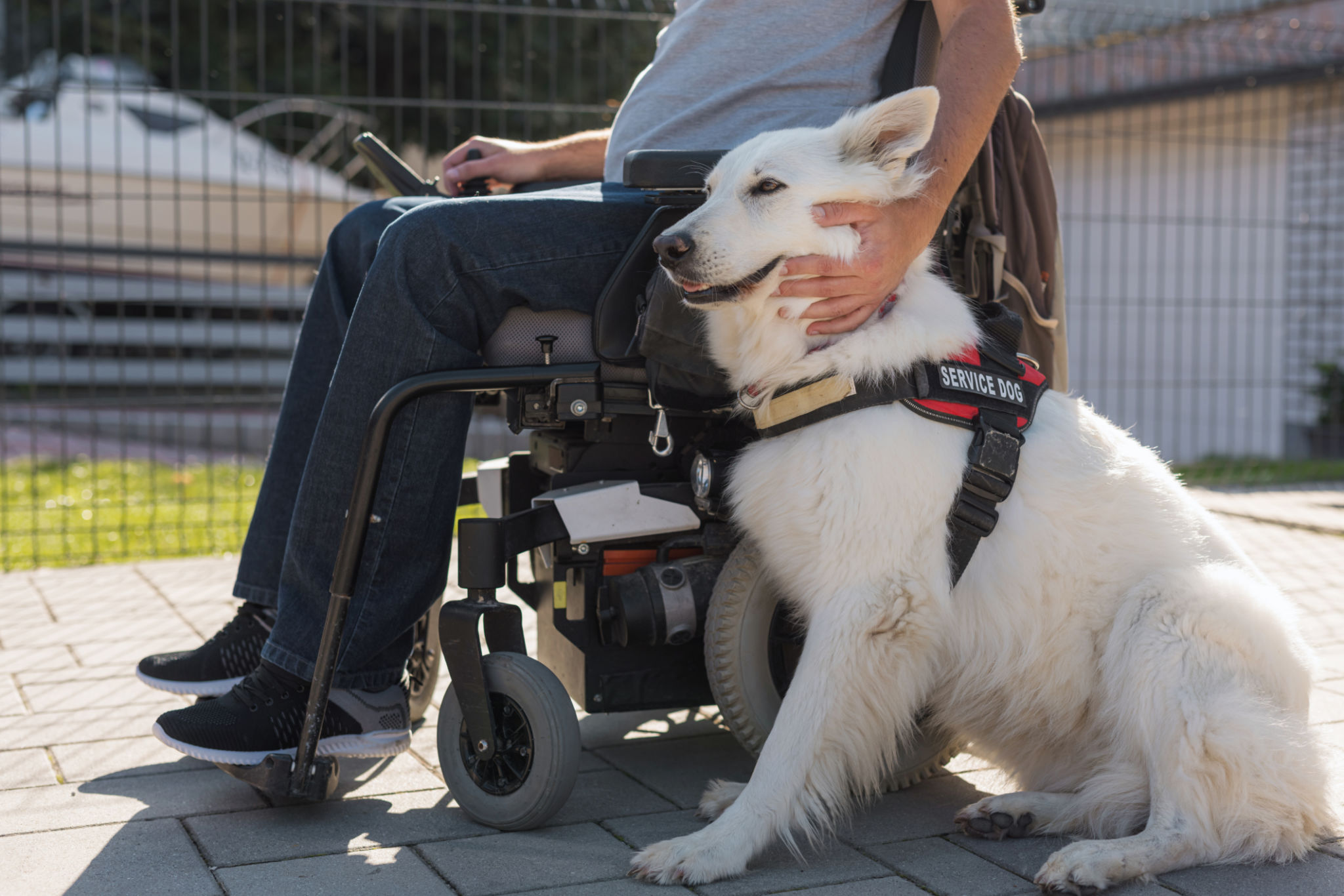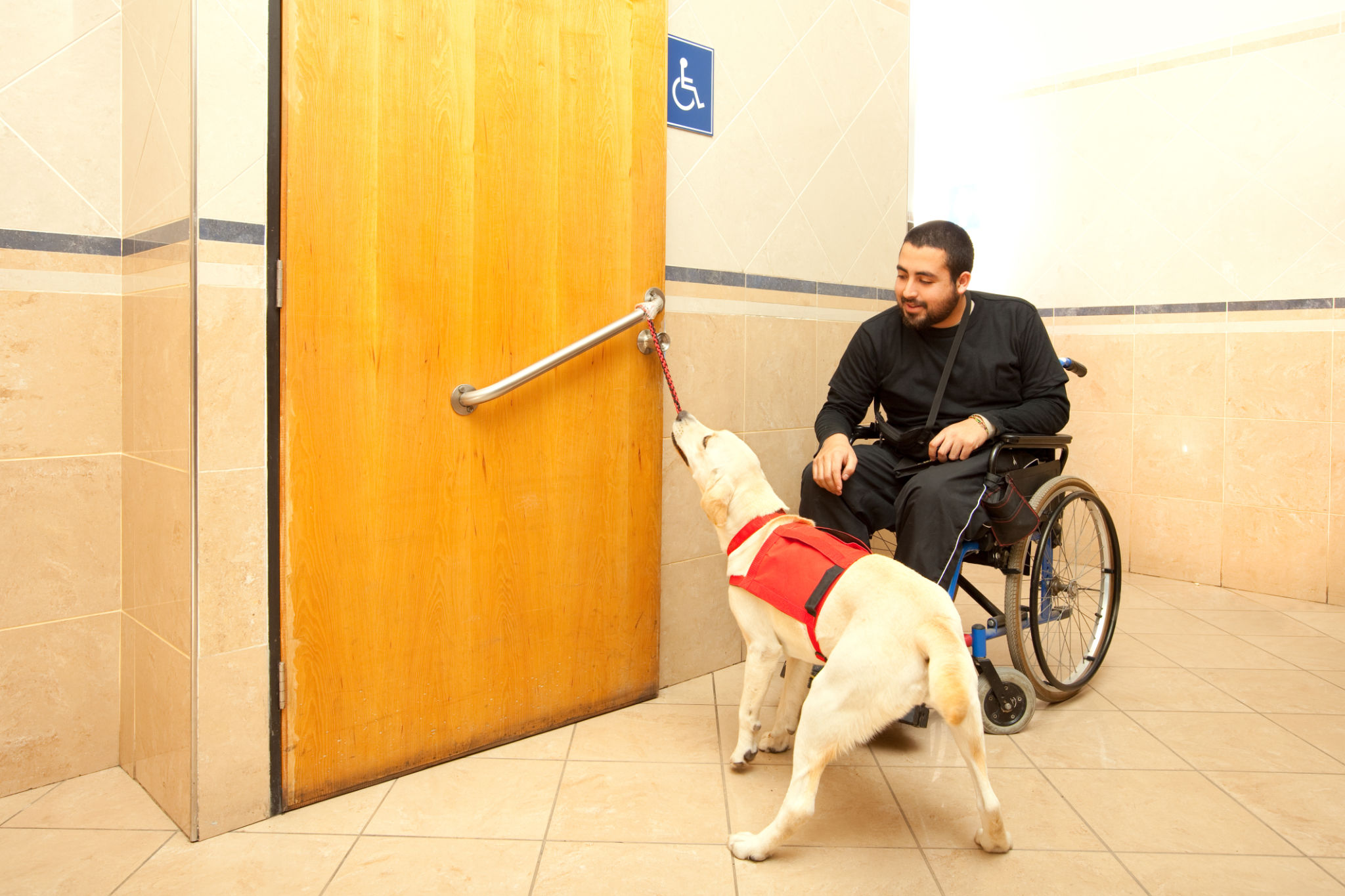Best Breeds for a Service Dog: Finding the Perfect Partner
Al
What Service Dog Breed is right for me?
Selecting the right breed for a service dog is one of the most important steps in building a successful partnership. Not all breeds are equally suited for the physical, emotional, and behavioral demands of service work, but service dogs come in all shapes, sizes, and breeds. Below, we’ll explore some top breeds for service work, dispel common myths, and emphasize the value of focusing on the individual dog’s abilities rather than just its breed.

Debunking a Common Myth: Service Dogs Aren’t Limited to Labs or Shepherds
One widespread misconception is that only Labrador Retrievers or German Shepherds can be service animals, and anything else is “fake.” This belief couldn’t be further from the truth.
Service animals are not restricted to specific breeds. According the Americans with Disability Act any breed of dog can be a service animal as long as the dog is individually trained to perform tasks that assist an individual with a disability. Whether the dog is tiny enough to fit in your lap or large enough to support physical stability, what truly matters is their training and suitability for the tasks they’re performing.
To learn more about ADA Service Animal requirements you can click Here.
For example:
- Small Dogs: Breeds like Chihuahuas and Miniature Poodles are excellent for tasks such as alerting their handlers to mood changes, medical conditions, or the onset of anxiety attacks.
- Large Dogs: Breeds like Great Danes or Bernese Mountain Dogs excel in tasks requiring strength and stability, such as providing balance assistance for individuals with mobility challenges.
While some breeds, like Labs and Shepherds, are more common due to their temperament and trainability, the range of service dog breeds is as diverse as the needs they address.
What Makes a Breed Suitable for Service Work?
Certain traits make a dog more likely to succeed as a service animal. Here’s what to look for:
- Trainability: High intelligence and the ability to learn complex tasks.
- Temperament: A calm, friendly, and non-aggressive demeanor.
- Size: Appropriate for the tasks the dog will perform, from small for alert work to large for mobility assistance.
- Health: Strong overall health and a lack of genetic predisposition to major illnesses ensure a long working life.
- Work Ethic: A desire to work and bond closely with their handler.

Top Breeds for Service Dog Work
1. Labrador Retriever
- Why They’re Great: Labs are versatile, friendly, and eager to learn. They excel in retrieving items, guiding individuals, and providing emotional support. Labrador retrievers are arguably the most popular choice when it comes to therapy dogs.
- Notable Traits: Known for their gentle “soft mouth,” Labs can handle and retrieve objects without damaging them.
2. Golden Retriever
- Why They’re Great: Gentle and intuitive, Golden Retrievers are ideal for individuals with anxiety, depression, or physical disabilities.
- Notable Traits: Their empathy and eagerness to please make them exceptional psychiatric service dogs.
3. Standard Poodle
- Why They’re Great: Intelligent and hypoallergenic, Standard Poodles are a great choice for individuals with allergies.
- Notable Traits: Their versatility makes them suitable for a variety of tasks, from psychiatric support to mobility assistance.
4. German Shepherd
- Why They’re Great: German Shepherds are highly focused, loyal, and adaptable to numerous roles, including guiding, mobility support, and medical alert tasks.
- Notable Traits: They’re popular assistance dogs due to their protective instincts and strong work ethic, making them both reliable and comforting.
5. Bernese Mountain Dog
- Why They’re Great: These gentle giants are excellent for mobility tasks due to their size and strength.
- Notable Traits: Their calm and affectionate nature makes them perfect for quieter environments.
6. Great Dane
- Why They’re Great: With their height and strength, Great Danes excel at balance and stability tasks. They also have a sweet temperament, which makes them great for psychiatric support, especially for children.
- Notable Traits: Their size can be both an asset and a challenge, requiring careful consideration of lifestyle and space.
7. Border Collie
- Why They’re Great: Known for their intelligence and problem-solving skills, Border Collies are incredibly versatile.
- Notable Traits: Their high energy level makes them ideal for active handlers, but they require consistent exercise and mental stimulation.
8. Mixed Breeds
- Why They’re Great: Many mixed breeds combine desirable traits for service work. Shelters and rescues often evaluate dogs for their service potential.
- Notable Traits: Adopting a mixed-breed service dog can provide a rewarding experience while giving a loving home to a rescue dog.

Luciano’s Story: A Vizsla Proving That Any Breed Can Be a Great Service Dog
While popular breeds dominate the lists of service dogs, exceptional service animals can come from unexpected places. Luciano, my Vizsla, is one such example.
Vizslas are not traditionally associated with service work, but their deep loyalty, high energy, and affection make them wonderful companions. Luciano has supported me through anxiety and depression, performing tasks such as grounding me during moments of heightened stress and providing comfort when I need it most.
Training Luciano required dedication, as Vizslas thrive on consistent exercise and mental engagement. With patience and effort, I channeled his energy into meaningful tasks and built a bond of trust that has made him an extraordinary partner.
Luciano’s story proves an important point: any breed, when paired with the right training and temperament, can become an incredible service dog.
Service Dogs: Beyond Breeds
The best service dogs are defined by their abilities, not their breed. Whether it’s a Chihuahua providing seizure alerts or a Great Dane offering stability support, the dog’s capacity to work or perform tasks needed by their handler is what truly matters.
Choosing the Right Breed for You
The breeds highlighted here are some of the most commonly recommended for service work, but the best choice depends on your unique situation. A dog’s individual traits, lifestyle compatibility, and training potential should guide your decision.
If you’re unsure where to start, feel free to reach out to us here at Paws On Planes Inc. We can help advise you on the perfect partner to meet your needs.
Final Thoughts
The world of service dogs is as diverse as the people they support. From traditional breeds like Labs and Goldens to unique companions like Vizslas and mixed breeds, every service dog has the potential to change a life.
Have a unique story about your service dog? Share your experience in the comments—we’d love to hear from you!
